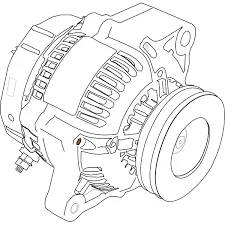Tag: difference between generator & alternator
Difference Between Alternator And Generator
Difference Between Alternator And Generator: Alternators and generators are both devices that convert mechanical energy into electrical energy, but they operate on different principles and have distinct characteristics. Here’s a comparison of the key differences between alternators and generators:
Difference Between Alternator And Generator
1. Operating Principle:
- Alternator: An alternator generates electricity using the principle of electromagnetic induction. It produces alternating current (AC), where the direction of current flow continuously reverses at a specific frequency.
- Generator: A generator, often referred to as a dynamo or DC generator, produces direct current (DC) through electromagnetic induction. It typically uses a commutator to convert alternating voltage into direct current.
2. Type of Current Produced:
- Alternator: Produces alternating current (AC), which periodically changes direction. The voltage and current alternate in polarity and direction.
- Generator: Produces direct current (DC), where the voltage and current flow consistently in one direction.
3. Output Voltage:
- Alternator: Alternators usually produce higher voltages (AC) suitable for many electrical applications. Voltage regulation is typically easier in alternators.
- Generator: Generators typically produce lower voltages (DC) and require additional components like voltage regulators to achieve stable output.
4. Maintenance:
- Alternator: Alternators generally require less maintenance compared to generators. They have fewer moving parts and do not have brushes and commutators, which wear out over time.
- Generator: Generators may require more maintenance due to the brushes and commutators that need periodic replacement. This maintenance can be more demanding and costly.
5. Efficiency:
- Alternator: Alternators are generally more efficient in converting mechanical energy into electrical energy. They are commonly used in modern vehicles due to their efficiency.
- Generator: Generators may have lower efficiency due to the energy losses associated with the commutator and the conversion of AC to DC.
6. Applications:
- Alternator: Alternators are widely used in automobiles to charge the battery and power electrical systems. They are also used in power generation stations to produce AC electricity.
- Generator: Generators are often found in smaller, portable applications, such as backup power sources, construction sites, and older electrical systems that require DC power.
7. Output Frequency:
- Alternator: Alternators produce AC with a specific frequency, usually 50 or 60 Hz, depending on the application and location.
- Generator: Generators do not have a fixed frequency; the output frequency depends on the rotational speed and design of the generator.

In summary, the primary difference between alternators and generators lies in the type of current they produce (AC vs. DC) and their operating principles. Alternators generate AC and are more efficient, while generators produce DC and may require more maintenance. The choice between them depends on the specific requirements of the application.
Read More
- Physical & chemical properties of water
- Difference Between Fuse And Circuit Breaker
- Difference Between Electromagnet And Permanent Magnet
- Blind Visually Impaired Optical Low Vision Aids
- Bar Magnet As An Equivalent Solenoid
Frequently Asked Questions (FAQs) Difference Between Alternator And Generator
1. What is the fundamental difference between an alternator and a generator?
The main difference lies in the type of current they produce. An alternator generates alternating current (AC), while a generator produces direct current (DC).
2. How do alternators and generators operate differently?
Alternators work on the principle of electromagnetic induction, producing AC through changing magnetic fields. Generators also use electromagnetic induction but typically employ a commutator to convert AC to DC.
3. Can you explain the output voltage differences between alternators and generators?
Alternators generally produce higher-voltage AC, while generators typically yield lower-voltage DC. Alternators may have built-in voltage regulation, making their output more stable.
4. Which one is easier to maintain, an alternator or a generator?
Alternators are generally easier to maintain because they have fewer moving parts and do not require components like brushes and commutators, which can wear out.
5. In terms of efficiency, which is better, an alternator or a generator?
Alternators are typically more efficient in converting mechanical energy into electrical energy compared to generators, which may have energy losses due to the commutator and AC-to-DC conversion.